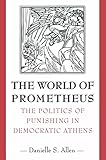The World of Prometheus : The Politics of Punishing in Democratic Athens / Danielle S. Allen.
Material type: TextPublisher: Princeton, NJ : Princeton University Press, [2009]Copyright date: ©2000Edition: Course BookDescription: 1 online resourceContent type:
TextPublisher: Princeton, NJ : Princeton University Press, [2009]Copyright date: ©2000Edition: Course BookDescription: 1 online resourceContent type: - 9780691094892
- 9781400824656
- KL4395
- online - DeGruyter
- Issued also in print.
| Item type | Current library | Call number | URL | Status | Notes | Barcode | |
|---|---|---|---|---|---|---|---|
 eBook
eBook
|
Biblioteca "Angelicum" Pont. Univ. S.Tommaso d'Aquino Nuvola online | online - DeGruyter (Browse shelf(Opens below)) | Online access | Not for loan (Accesso limitato) | Accesso per gli utenti autorizzati / Access for authorized users | (dgr)9781400824656 |
Frontmatter -- CONTENTS -- PREFACE -- INTRODUCTION -- PART ONE: THE PRELIMINARIES -- PART TWO: THE PROCESS OF PUNISHING -- PART THREE: INTERVENTIONS IN THE CONVERSATION -- EPILOGUE: The Reform of Prometheus and Promethean Rebellion -- Appendixes -- NOTES -- BIBLIOGRAPHY -- INDEX
restricted access online access with authorization star
http://purl.org/coar/access_right/c_16ec
For Danielle Allen, punishment is more a window onto democratic Athens' fundamental values than simply a set of official practices. From imprisonment to stoning to refusal of burial, instances of punishment in ancient Athens fueled conversations among ordinary citizens and political and literary figures about the nature of justice. Re-creating in vivid detail the cultural context of this conversation, Allen shows that punishment gave the community an opportunity to establish a shining myth of harmony and cleanliness: that the city could be purified of anger and social struggle, and perfect order achieved. Each member of the city--including notably women and slaves--had a specific role to play in restoring equilibrium among punisher, punished, and society. The common view is that democratic legal processes moved away from the "emotional and personal" to the "rational and civic," but Allen shows that anger, honor, reciprocity, spectacle, and social memory constantly prevailed in Athenian law and politics. Allen draws upon oratory, tragedy, and philosophy to present the lively intellectual climate in which punishment was incurred, debated, and inflicted by Athenians. Broad in scope, this book is one of the first to offer both a full account of punishment in antiquity and an examination of the political stakes of democratic punishment. It will engage classicists, political theorists, legal historians, and anyone wishing to learn more about the relations between institutions and culture, normative ideas and daily events, punishment and democracy.
Issued also in print.
Mode of access: Internet via World Wide Web.
In English.
Description based on online resource; title from PDF title page (publisher's Web site, viewed 08. Jul 2019)


